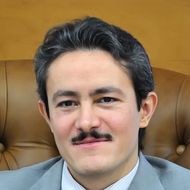Defending a Doctor of Science Thesis at HSE University under New Procedure

Dean Fantazzini, Deputy Head of the Department of Econometrics and Mathematical Methods in Economics at Moscow School of Economics in Moscow State University and Visiting Scholar at the HSE ICEF, was the first foreigner to defend his DSc thesis at HSE University. We spoke with Dean Fantazzini about his research and cooperation with HSE.

I decided to defend my thesis at HSE because it was possible to use the original published articles, without the need to write a full dissertation (except for a small-sized general summary). This is much more comfortable and it makes more sense scientifically than writing a new dissertation which would only be a very large summary of the original publications.
My Doctor of Sciences thesis is entitled ‘Modelling and forecasting univariate and multivariate time series using Google data and copulae’. The quick development of the internet and information technology (IT) worldwide has given access to a large amount of data, which are usually known as “big data".
One of the main tools that can be used to analyze big data is a search engine, which is often considered the first step in the consumer decision-making process, to understand social dynamics and to make better predictions. My dissertation investigated several cases where it is possible to model and forecast economic and financial time series using Google data and/or copula models.
The papers of my dissertation strongly contributed to the understanding of how Google data explain consumer and investor decision-making processes in several economic and financial fields, from risk management to crypto-currencies, from bubble modelling and testing to energy markets, from social welfare to social well-being, highlighting both advantages and disadvantages.
Copula models can deal with departures from the assumption of normality and they are computationally tractable even with large datasets, thus solving two important issues when dealing with big data. Particularly in finance, the use of copulas represented a major step forward in modelling complex multivariate dynamics.
The papers of my dissertation further developed the econometric theory of copulas, focusing on the T-copula, which is the most important for risk and portfolio management. Moreover, they improved the understanding of the effects of biased multivariate estimates on risk measurement.
I was among the first to propose copulas for modeling high dimensional operational risks in a more flexible way, which is currently one of the main approaches to modeling and measuring operational risks.
At the end of 2019, the papers that constitute this dissertation were cited almost 400 times according to Google Scholar. Several results discussed in these papers were included in the monograph titled "Quantitative finance with R and Cryptocurrencies" published by Amazon KDP in 2019. This textbook was officially presented at the Russian Central Bank on the Octover 22, 2019. The papers of this dissertation are often used in the professional field, particularly in risk management and business planning, and several professionals contacted me for comments and suggestions.
The actual defense was conducted via Zoom because of the pandemic. After my initial presentation, the five members of the scientific committee asked me several questions related to my dissertation. At the end, they voted whether to accept or not my work: the final tally was 5 votes in favor and 0 against.
My work now is going great: after the successful defense of the title of Doctor of Science, I was nominated full professor by my faculty at the Moscow State University. I also continue my cooperation with HSE.
I first met with some HSE colleagues during seminars held at the CEMI (Central Economic Mathematical Institute) in Moscow back in 2007. I have been living and working in Moscow since 2007—I took a position in Russia for both work and personal reasons—my girlfriend (now my wife) was living in Moscow at the time.
Now, I teach a course at ICEF-HSE on R Programming and Applications to Finance, and I supervise the dissertations of four ICEF Master students per year (on average). It is my plan to supervise in the future one or two PhD students from the Faculty of Economic Sciences at HSE.
I have several colleagues and friends at HSE, but the person I currently work with most closely is Anatoly Peresetsky. Our joint interests include such topics as financial econometrics and big data analysis. In general, the collaboration was positive because I managed to publish several articles.
Anatoly Peresetsky
Research Professor, Department of Applied Economics
Dean Fantazzini
Visiting Lecturer, ICEF
See also:
Pivot to the East: A Comprehensive Study of the Cultural and Civilisational Centres of the Non-Western World is the Top Priority
China and the Chinese world, South Asia, Southeast Asia, the Arab countries, Iran, Turkey, Central Asia and Africa are gaining new significance in Russia’s foreign policy. However, we do not know enough about the Eastern countries. It is necessary to change the priorities in education, starting from grammar school. Prospects for the development of domestic Oriental studies in the context of the new stage in the development of the system of international relations were discussed at a round table at HSE University.
‘I Admire HSE Students’ Eagerness to Learn, to Discuss, to Broaden Their Perspectives’
Robert Romanowski was a ‘Digital Professor’ at HSE University in November 2021. In his interview for the HSE News Service, he talked about the specifics of online teaching, his course on Strategic Branding, and the skills that are essential for marketing professionals today.
Russia and Africa: Time to Expand Cooperation
There is major potential for economic and humanitarian cooperation between Russia and African countries. Particularly, Russian organisations and universities can help transfer competencies and knowledge in the fields of agriculture, energy, industrial production, environmental management, climate change, and public administration. Experts and representatives of African embassies in Russia discussed these issues at the round table ‘Russia-Africa Sharing Knowledge’ hosted by HSE University.
The Brain in Space: Investigating the Effects of Long Spaceflights on Space Travellers
As part of an international project conducted with the participation of Roscosmos and the European Space Agency, a team of researchers used differential tractography to analyse dMRI scans ofcosmonauts’ brains and found significant changes in brain connectivity, with some of the changes persisting after seven months back on Earth. The paper is published in Frontiers in Neural Circuits.
HSE University-Perm and the Training Centre of the Uzbek Ministry of Finance Sign Cooperation Agreement
HSE University in Perm has become the first academic partner of the Training Centre under the Ministry of Finance of the Republic of Uzbekistan. The parties have signed a cooperation agreement in education and research.
HSE University Strengthens Ties with Netherlands in Agricultural Research and Education
On November 9, 2021, HSE University signed a memorandum of understanding with Wageningen University & Research, a major university in the Netherlands and one of the leading agricultural research institutes in the world. Participants of the signing ceremony included HSE University Rector Nikita Anisimov, President of the Wageningen University & Research Executive Board Professor Louise Fresco, and Dutch Ambassador to Russia Gilles Beschoor Plug.
The Majority of Russians Do Not Support Microchip Implants
The majority of Russians would not agree to being fitted with microchip implants for any purposes—medical or otherwise. A joint study conducted by HSE University’s International Laboratory for Applied Network Research and Aventica found that respondents believe the risks of personal data leaks and misuse to be too high.
‘We Can Now Say That the Finance Conference Is Global’
The 10th International Moscow Finance Conference, organized by HSE ICEF, took place on October 29–30 online. Vladimir Sokolov, Head of the International Laboratory of Financial Economics, which hosted the conference, talks about the participants, the key presentation topics and how they will impact the global economy.
HSE University Scholars Study Green Transition Risks and Greenhouse Gas Emission Regulation
The UN Climate Change Conference is taking place from October 31 to November 12 in Glasgow. The conference focuses on preventive measures against the catastrophic and irreversible consequences of rising average global air temperatures. Igor Makarov, Head of the HSE Laboratory for Economics of Climate Change, will be taking part in the Glasgow conference. In the following interview, he speaks about the pressing problems Russia and the world are facing, and the research HSE scholars are doing on climate change.
Applications to Speak at eSTARS 2021 Conference Accepted Until November 15
HSE University and Coursera are bringing together the world’s leading researchers, professionals, education and technology leaders, and business community representatives for the fourth international research conference eLearning Stakeholders and Researchers Summit 2021 (eSTARS). This topic of this year’s summit, which will run from December 1–2, 2021,is ‘Digital Transformation: Global Challenges to the Education System’.


